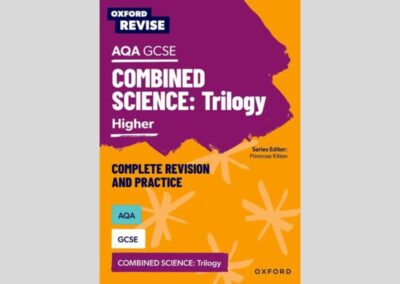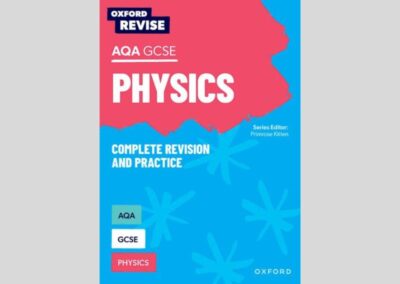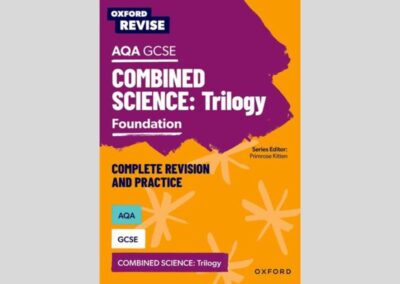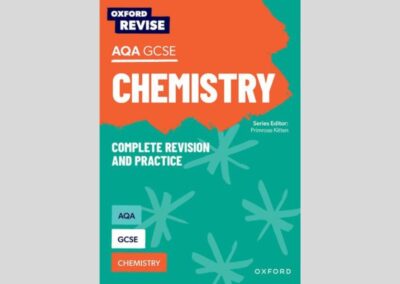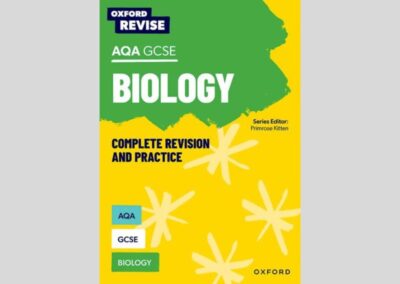Science GCSE Revision
We can show you how to make your Science GCSE revision count by offering a structured and effective approach to exam preparation, so that that you walk into the exam hall with confidence. Welcome to the home of revision that works!
Oxford Revise has been developed by cognitive science experts, specifically designed to help the information get stuck in your long-term memory. We’ve got lots of support to help you make every minute of your revision count as you prepare for your Science GCSEs including experiment videos from Big Manny and lots of top tips and advice from Series Editor Primrose Kitten.
Be like this science whizz and let Oxford Revise help you too:
“Managed to jump up 4 grades from this book. Totally recommend it. Life saver with plenty of exam questions and materials inside.”
Amazon review
How does Oxford Revise support your Science GCSE revision?
In essence, we have a wealth of experience in supporting students for AQA Biology, Chemistry, Physics and Combined Science Trilogy GCSE exams. Our guides and our approach have been popular in science departments for years. Here’s what they like about it:
- Knowledge organisers: To begin with you need to know what knowledge is important and you have knowledge organisers which clearly lay this out for you. In fact, our team have organised the core specification in a way that helps you to see how concepts build from each other and how they link across topics.
- Retrieval practice: Quick-recall questions have been proven to move knowledge from your short-term to your long term memory. Completing the simple act of look, cover, write, and check repeatedly until you get them all right is an active way to memorise the key information. Furthermore, you can use them to create flashcards for you to test yourself across topics, or work with someone else to test each other.
- Practice questions: There are 1000s, yes 1000s, of exam-style questions inside the pages of the Oxford Revise guides for Science. Completing a wide-range of common question types for each topic will make sure that you are familiar with what to expect on the day and be better prepared to apply what you’ve learned to different scientific contexts.
Our expert authors
Series editor: Primrose Kitten
Primrose Kitten
Series Editor for Oxford Revise Science. Author and experience Science teacher with a passion for helping students to achieve their best. Primrose Kitten started in 2015 aiming to teach students via YouTube. What started as a small project now teaches hundreds of thousands of students and the Primrose Kitten YouTube channel has quickly grown to provide millions of hours of teaching.
Adam Robbins
Lead Practitioner, Science teacher, author and managing editor. He currently holds the role of Lead Practitioner for whole-school CPD and spends his time working with teachers, departments and leaders to fulfil their CPD aims. A role he also offers outside of his school to other educational establishments.
2025-2026 Exam dates
Biology (Single Science and Combined Science)
Tuesday, 12 May 2026, PM: Paper 1
Monday, 8 June 2026, AM: Paper 2
Chemistry (Single Science and Combined Science)
Monday, 18 May 2026, AM: Paper 1
Friday, 12 June 2026, AM: Paper 2
Physics (Single Science and Combined Science)
Tuesday, 2 June 2026, AM: Paper 1
Monday, 15 June 2026, AM: Paper 2
GCSE results day
| GCSE results published |
| Thursday 21 August 2025 |
| Thursday 20th August 2026 |
| Thursday 19th August 2027 |
| Thursday 19th August 2028 |
| Thursday 23rd August 2029 |
| Thursday 22nd August 2030 |
Useful links
Revision resources
Big Manny’s experiments
Top revision tips
Revision and exam support
Science with Big Manny: Chromatography
Check out Oxford Revise’s series of science experiment videos. In this experiment, watch Manny use chromatography to separate ink.
Science practicals with Big Manny
Big Manny goes through his top tips to help you make the most of your science practicals so that you can confidently answer questions on practical techniques in your Chemistry GCSE.





